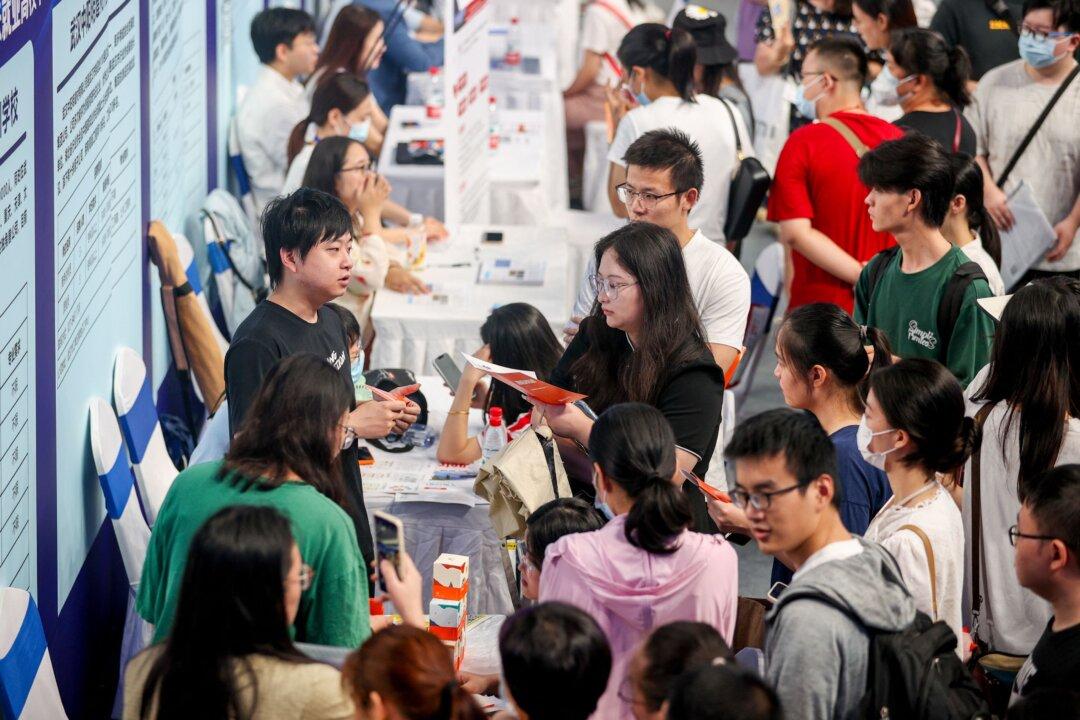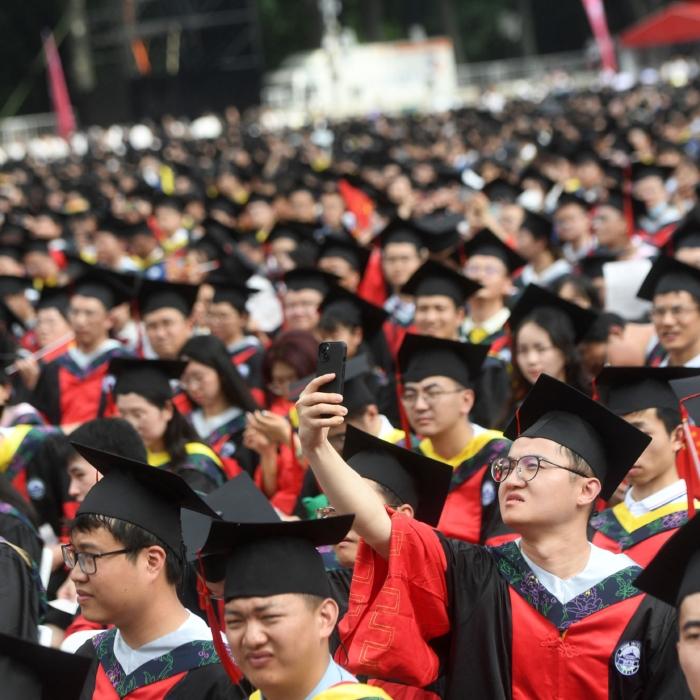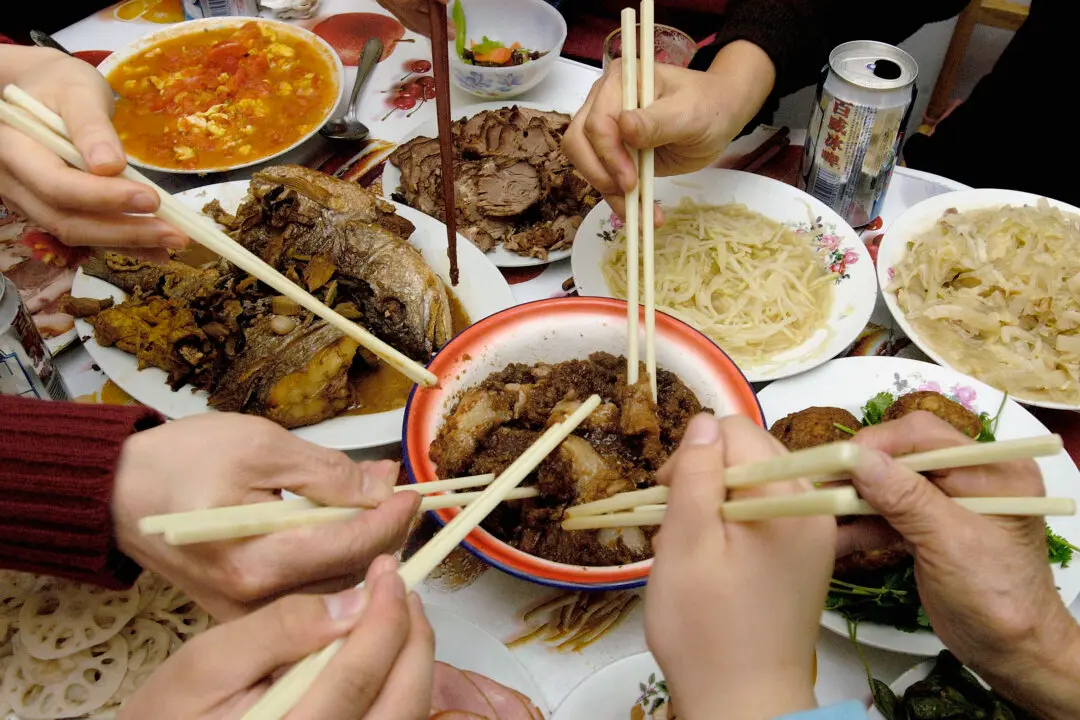China’s youth unemployment crisis is being driven not only by the country’s economic woes, but also by failures of communist regime’s ideological education system, according to China watchers and educators.
They say university and college graduates in China lack essential skills needed to drive economic growth because the regime’s education system, including its forced sinicization on ethnic minorities, discourages free thinking and disincentivizes students to engage in vocational studies.
Skills Mismatch
According to some China observers, there is a mismatch between the available job vacancies and the preferences of job seekers.“The Chinese real estate market and high tech market, where many college graduates sought work, are still in a post-pandemic slide,” while Chinese entrepreneurs have been slow to enter emerging sectors, Thomas said.
“Chinese students also have a penchant toward working in the government sector and in urban areas, both of which are saturated with an oversupply of people seeking jobs and housing.
“Add on the preference for older workers and the reluctance of established workers to leave their jobs, it makes job seeking very difficult.”
In December 2024, more than 3.4 million applicants passed the pre-screening for China’s civil service exam for some 39,700 public sector jobs. Nearly 2.6 million of these applicants took the exam, meaning 65 people were competing for one job.
Li Yuanhua, former associate professor at the Capital Normal University in Beijing, said this choice reflects the pervasive mammonist culture in Chinese society under the communist regime.
Students are incentivized to pursue careers in the state’s bureaucracy or businesses because they can bring higher financial returns and shun careers that require technical skills, Li told The Epoch Times.
When China’s universities resumed admissions of qualified students after the Cultural Revolution, higher education was rare, with only 2.7 percent of the college-aged population admitted to universities in 1978. The rate grew to 10.5 percent in 1999, when the regime began to expand university enrolment. In 2023, China’s third-level gross enrolment rate reached 60.2 percent, according to official figures.
However, Li said, universities saw admissions as “a way to make money, not an opportunity to cultivate talents.” Therefore, the over-expansion of enrolment has allowed unqualified students to be admitted to a low-quality education system, and universities have not put enough resources into teaching skills needed in industries, he said, calling the enrolment expansion “a waste” of resources and students’ time.
Lack of Critical thinking
The over-emphasis on theoretical knowledge in China’s education system means that many students may lack experience with solving problems, “which is an important workplace skill,” Rebecca Clothey, head of the Department of Global Studies and Modern Languages at Drexel University in Philadelphia, told The Epoch Times.Clothey lived in China on and off for about six years between the early 1990s and the 2010s, during which she taught English, studied Chinese, and served as a visiting scholar in Urumqi, the capital of the Xinjiang region in northwest China.
Comparing the U.S. and Chinese educational systems, she said that “American students maybe are less strong in fact-based material, but more strong in critical thinking, analysis, and creativity; whereas Chinese students, maybe know more facts, but they don’t necessarily have the analytical, critical thinking, or creativity built into the curriculum the way American schools are supposed to.”
Part of the reason may lie in the difference between the two languages, according to Clothey.
“The only way to learn to read” the Chinese language is “to memorize,” she said.
“And so that is built into the way the academic approach is: the memorization, learning facts, learning what the book tells you or what the teacher tells you, and then being able to repeat it without necessarily thinking about what the book says,” she said.
“Whereas in English, we have to learn to read, and it’s not a memorization process, because it’s a phonetic. So starting from when children are young, there [are] habits that are developed that, I think, are reflected throughout the entire education system.”
Clothey said while the new generation of American students is also losing analytical skills, Chinese students have another disadvantage: the communist regime’s censorship of speech and its control over education.
“China has a state-run media. Everything in the news is government-run, and so there’s no alternative voice other than social media in China, which is also monitored by the government,” she said.
“So you don’t really get outside voices, and it makes it harder as an individual to synthesize, because you don’t have many different opinions that you can read and think about—you have one opinion, and that’s all you really are exposed to.”
She noted that China’s education system is “much more centralized” than that of the United States, meaning that the curriculum is not as culturally relevant in different areas, and that students who don’t find the curriculum to be as relevant are less likely to succeed.
Party-State Education
Thomas said China’s education system, “which is highly reliant on the state for funding and subservient to the demands of the Chinese Communist Party’s septuagenarian leaders, lacks the freedom to think and to criticise both in and out of the classroom.”“The lack of true academic freedom stupefies educators and students alike,” he said.
Li noted that Chinese university students are required to spend time on political courses, such as Marxism, Chinese Communist Party (CCP) history, and the communist and socialist ideologies of former CCP leaders.
He described China’s education system as “party-state education, brainwash education,” and an education subservient to the communist regime.
“Therefore, the system has always emphasised standard answers, especially in humanities and social sciences, students are not allowed to have independent thinking and opinions, and not allowed to talk about some basic facts,” he said.
Forced Sinicization
Having worked in Xinjiang, Clothey said it would be beneficial for China if the regime valued minority languages such as Uyghur and Tibetan.“For a period of time, when private English language schools were being encouraged in Urumqi, a lot of Uyghurs opened up English language schools in Urumqi that taught English in Uyghur, which was something they knew, so that Uyghurs who didn’t have good Chinese could still learn English. They could still have access to it,” she said.
“And the schools created curriculum materials that were also in Uyghur with Uyghur translations of English texts instead of Chinese translations of English texts, which were harder for Uyghurs who didn’t speak good Chinese.”
The schools “created an opportunity” for Uyghurs to learn and work, until the CCP changed its policies on private education, she said.
“I know certainly the Uyghur-run private schools are not available anymore, for sure,” she said, adding that many well-known English language schools across China have also been closed.
In the 1990s, the CCP began piloting bilingual education in Xinjiang, where children were taught both Uyghur and Mandarin, and launched a more aggressive push of bilingual education in 2004.
Survivors of the camps have described experiencing forced labor, forced sterilizations, political indoctrination, and other abuses during their time in detention.
The U.S. government has referred to the Chinese regime’s repression in Xinjiang as a genocide.
The United Nations human rights office in 2022 found that the regime’s clampdown on Uyghur Muslims could amount to crimes against humanity.
Beijing has repeatedly denied allegations of human rights violations in Xinjiang.
According to U.N. experts on human rights in Xinjiang, Uyghur children, whose parents were in detention or transferred to other regions in China, were treated as orphans and educated in institutions that only spoke Mandarin.







